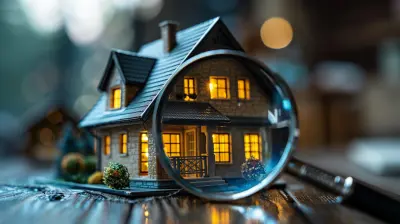How to Spot Fake Real Estate Agents and Protect Your Investments
6 October 2025
Buying or selling property is one of the biggest financial decisions you'll ever make. But what happens when you cross paths with a fake real estate agent? Scammers are lurking in the industry, ready to take advantage of unsuspecting buyers and sellers. The good news? You don’t have to fall into their traps!
In this guide, we'll walk you through how to spot fake real estate agents and protect your hard-earned investments. Let’s dive in! 
🚨 Red Flags: How to Identify a Fake Real Estate Agent
Not all real estate agents are who they claim to be. Some are frauds looking for quick cash. Here are the top signs that you're dealing with a fake agent:1. No Valid License or Credentials
A legitimate real estate agent should have a verified license issued by the appropriate real estate authority. Scammers often try to avoid this conversation or provide fake credentials.📌 How to Verify:
- Ask for their license number and verify it through your local real estate board.
- Search for their name in online real estate directories.
- Check if they are members of recognized real estate associations.
If they hesitate or get defensive when you ask for proof, that’s a red flag! 🚩
2. Pressure to Act Fast
A fraudulent agent will always pressure you to make decisions quickly. They’ll say things like:❌ “This deal won’t last, you need to pay now!”
❌ “Other buyers are lining up, hurry before you miss out!”
Real estate transactions should never feel rushed. A genuine agent will encourage you to take your time.
3. Unrealistically Low Prices
If a deal looks too good to be true, it probably is. Scammers lure victims with prices far below market value to spark quick interest.📌 How to Protect Yourself:
- Compare prices of similar properties in the area.
- If the price is significantly lower, ask why.
- Consult with a trusted real estate expert before making any payments.
4. No Physical Office or Professional Online Presence
A real estate agent without an office address or a website is suspicious. Legitimate professionals have a workspace, business contact details, and an established online presence.📌 Check Their Online Footprint:
- Look for an official website.
- Check for professional social media profiles (LinkedIn, Facebook, etc.).
- Read client reviews and testimonials.
If they have no traceable history, it's time to walk away.
5. Asking for Upfront Payments
Be very cautious if an agent asks for money before anything is finalized. Scammers often request upfront payments for fake “processing fees,” “reservation fees,” or “legal charges."📌 Protect Yourself:
- Never pay anything in cash without a legal agreement.
- Deposits should go through escrow accounts.
- Verify all payment requests with legal professionals. 
🏡 How Scammers Operate: Common Real Estate Scams
Fraudsters use clever tricks to deceive buyers and sellers. Here are some of the most common real estate scams:❌ Fake Property Listings
Scammers post listings for homes that don’t exist or aren’t available. They will pressure you into sending a deposit before seeing the property.🔍 How to Avoid This Scam:
- Visit the property in person.
- Verify ownership details with the local land registry.
- Deal only with verified agents or agencies.
❌ Title Fraud
In this scam, fraudsters impersonate homeowners and illegally transfer property documents to their name.🔍 How to Protect Yourself:
- Verify the seller’s identity before buying.
- Work with a trusted lawyer to authenticate property documents.
- Avoid cash transactions without proper documentation.
❌ Fake Investment Opportunities
Fraudsters often promote bogus real estate projects with promises of high returns. They collect funds from investors and disappear.🔍 How to Stay Safe:
- Research the developer or real estate company.
- Look for completed and successful past projects.
- Speak with past clients before investing. 
✅ Steps to Protect Yourself from Fake Real Estate Agents
Now that you know the red flags, let’s talk about how you can protect yourself and your investment!1. Do Your Homework
Before working with a real estate agent, research them thoroughly. Google their name, check reviews, and cross-check their credentials.2. Verify Licenses and Memberships
Check if the agent is licensed and affiliated with verified real estate organizations. Most real estate boards have online tools to verify licenses.3. Ask for References from Past Clients
A reputable agent will have a list of happy clients. Reach out to them and ask about their experience. If the agent refuses to provide references, be cautious.4. Use Secure Payment Methods
Always use escrow services or bank transfers when making payments related to real estate transactions. Never hand over cash without legal documentation.5. Insist on a Written Agreement
A real estate deal without a contract is risky. Ensure all agreements, commissions, and terms are in writing before moving forward.6. Consult a Legal Expert
Before signing anything, have a lawyer review the documents. A legal expert can detect irregularities and protect your interests.7. Trust Your Gut
If something feels off, don’t brush it aside. Scammers rely on people ignoring their instincts. If you're uncomfortable with an agent’s behavior, walk away.
🔍 What to Do If You’ve Been Scammed
If you suspect you’ve fallen victim to a fake real estate agent, take immediate action:1. Report the scam to local real estate authorities and consumer protection agencies.
2. File a police report if money has been stolen.
3. Warn others by sharing your experience on real estate forums and review sites.
4. Seek legal assistance to explore possible recovery options.
The faster you act, the better your chances of holding the fraudster accountable.
Final Thoughts
The real estate world is full of opportunities, but it also has its fair share of scammers. By staying informed and cautious, you can easily avoid fake agents and protect your investments.Remember: A good deal is only good if it’s real. If an agent seems shady, don’t be afraid to walk away. Your dream property is out there—just make sure you find it with a legitimate, trustworthy agent!
Stay smart, stay safe, and happy house hunting!
all images in this post were generated using AI tools
Category:
Real Estate ScamsAuthor:

Lydia Hodge
Discussion
rate this article
1 comments
Amber McElhinney
Great insights! Trust your instincts, verify credentials, and always research before committing. Protecting your investment starts with informed choices.
October 6, 2025 at 10:46 AM

Lydia Hodge
Thank you! I'm glad you found the insights valuable. Trusting your instincts and doing thorough research are indeed key to protecting your investments.


